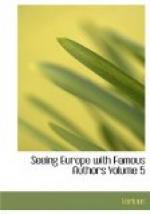This staircase, which is of colossal size, is ornamented with casts from the finest antiques. Copies of the metopes of the Pantheon and friezes from the temple of Theseus are set into its walls, and upon one of the landings stands the Pandrosion, with all the strong and tranquil beauty of its Caryatides. The effect of the whole is very grand. At the present day there is no longer any visible difference between the people of one country and of another. The uniform domino of civilization is worn everywhere, and no difference in color, no special cut of the garment, notifies you that you are away from home. The men and women whom I met in the street escape description; the flaneurs of the Unter den Linden are exactly like the flaneurs of the Boulevard des Italiens. This avenue, bordered by splendid houses, is planted, as its name indicates, with lindens; trees “whose leaf is shaped like a heart,” as Heinrich Heine remarks—a peculiarity which makes Unter den Linden dear to lovers, and eminently suited for sentimental interviews. At its entrance stands the equestrian statue of Frederick the Great. Like the Champs-Elysees in Paris, this avenue terminates at a triumphal arch, surmounted by a chariot with four bronze horses. Passing under the arch, we come out into a park in some degrees resembling the Bois de Boulogne.
Along the edge of this park, which is shadowed by great trees having all the intensity of northern verdure, and freshened by a little winding stream, open flower-crowded gardens, in whose depths you can discern summer retreats, which are neither chalets, nor cottages, nor villas, but Pompeiian houses with their tetrastylic porticos and panels of antique red. The Greek taste is held in high esteem in Berlin. On the other hand, they seem to disdain the style of the Renaissance, so much in vogue in Paris; I saw no edifice of this kind in Berlin.
Night came; and after paying a hasty visit to the zoological garden, where all the animals were asleep, except a dozen long-tailed paroquets and cockatoos, who were screaming from their perches, pluming themselves, and raising their crests, I returned to my hotel to strap my trunk and betake myself to the Hamburg railway station, as the train would leave at ten, a circumstance which prevented me from going, as I had intended, to the opera to hear Cherubini’s “Deux Journees,” and to see Louise Taglioni dance the Sevillana....
For the traveler there are but two ways: the instantaneous proof, or the prolonged study. Time failed me for the latter. Deign to accept this simple and rapid impression.




